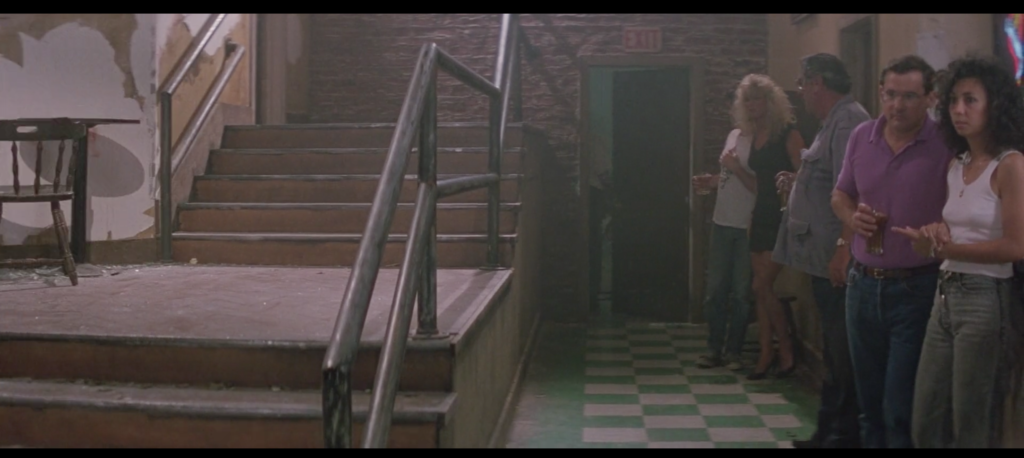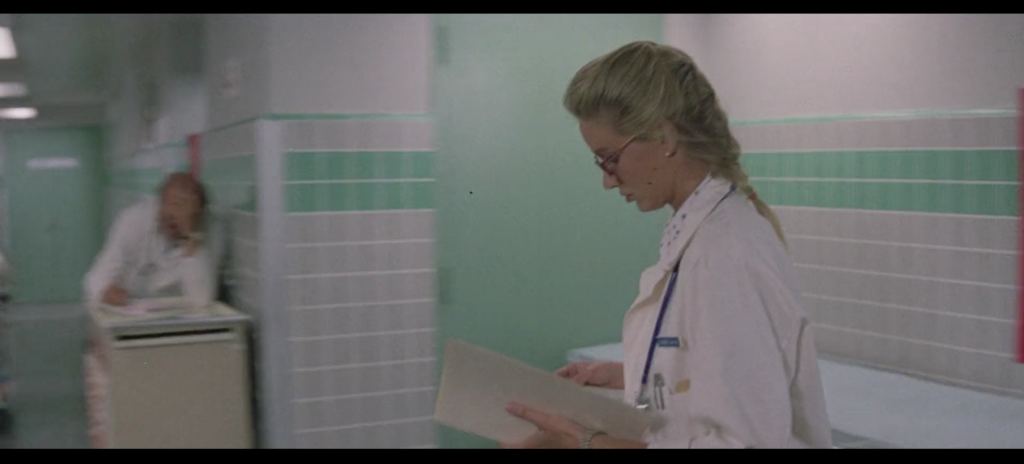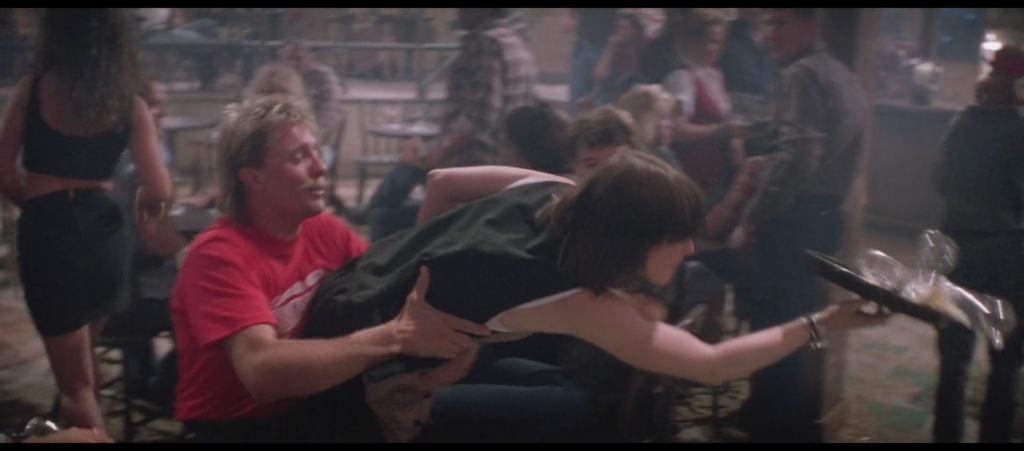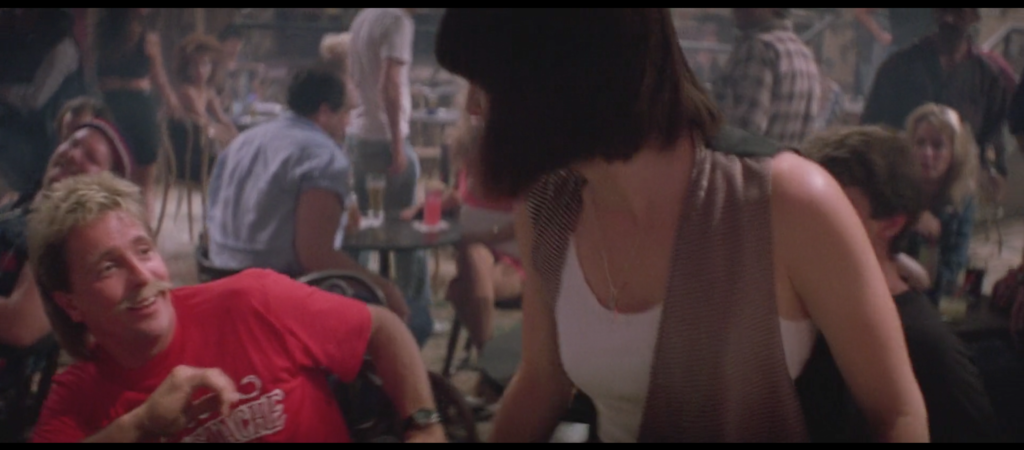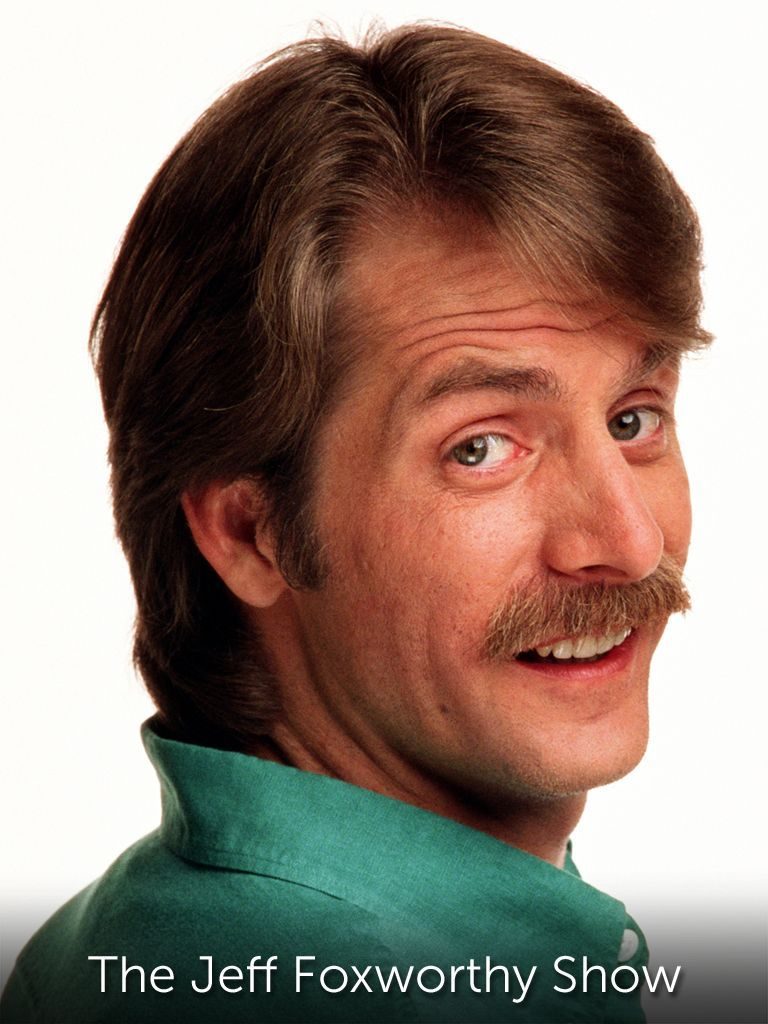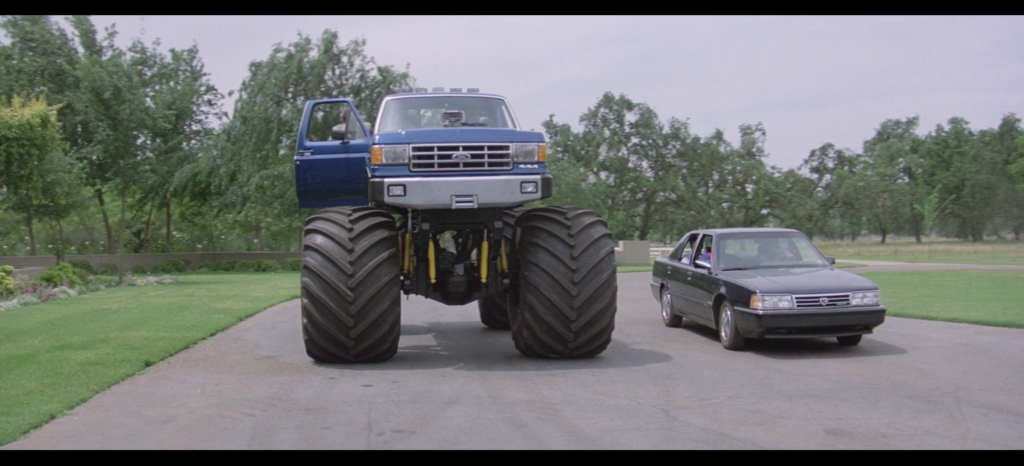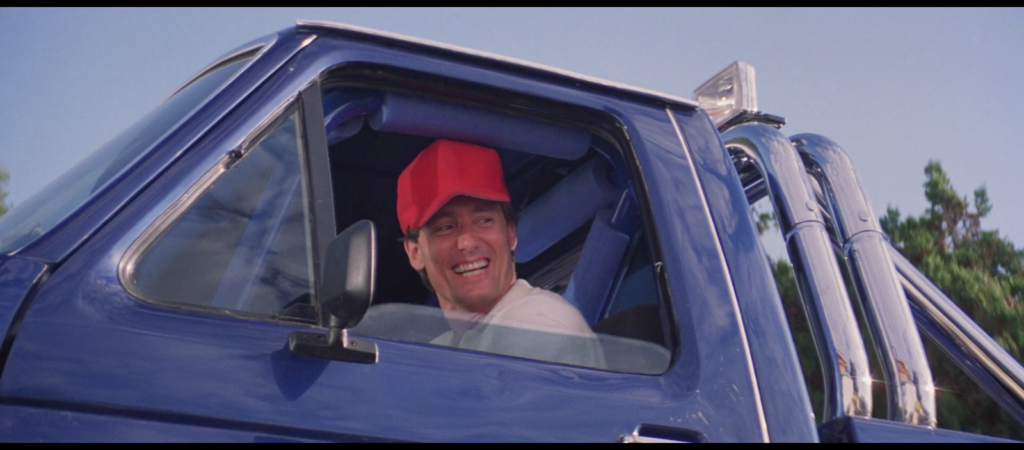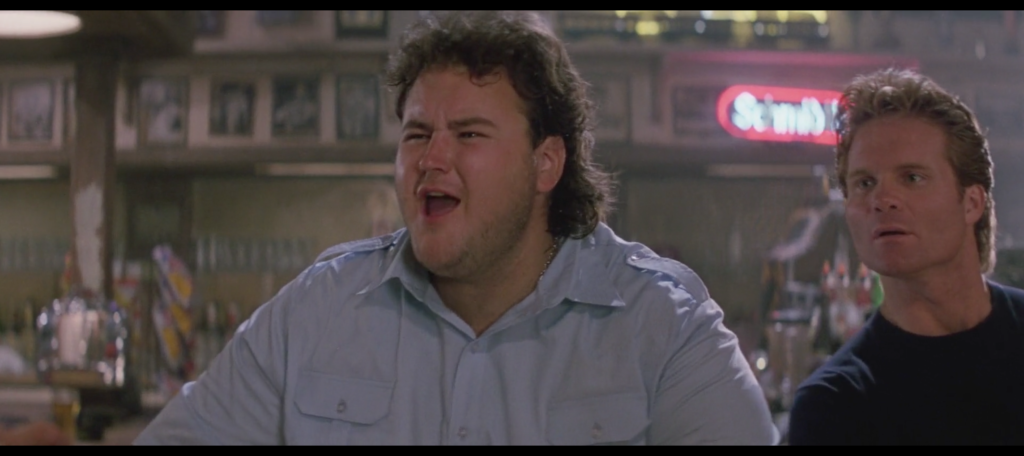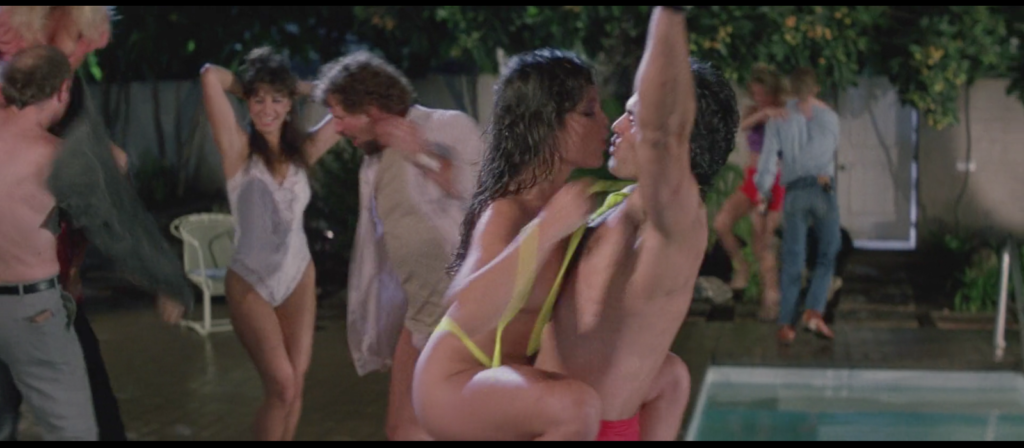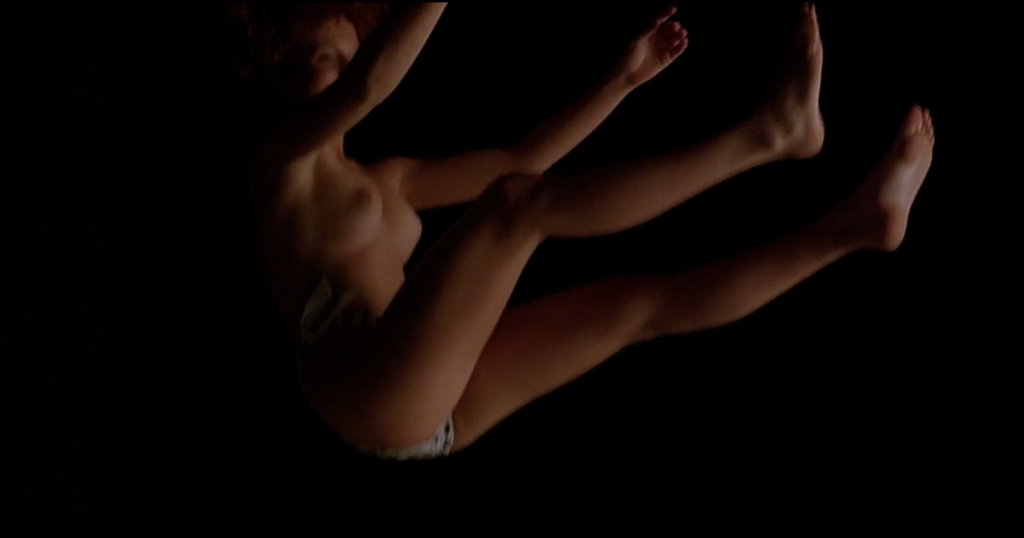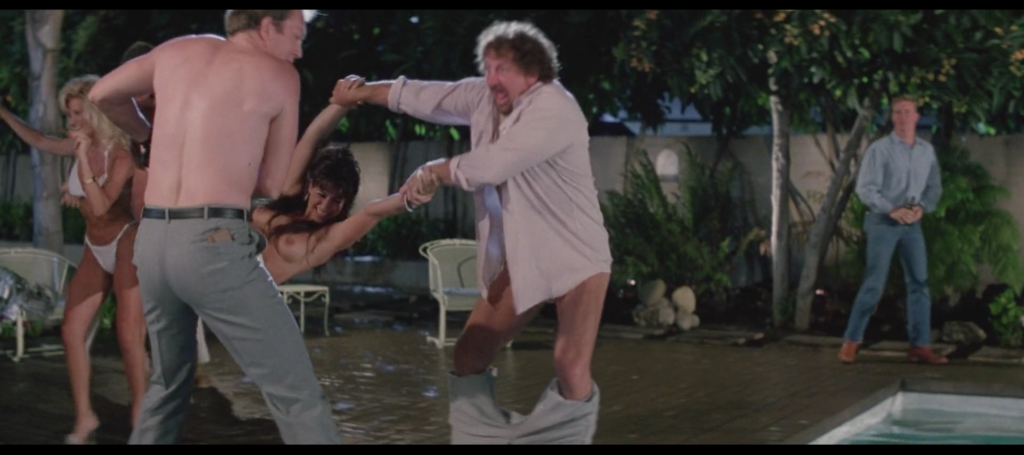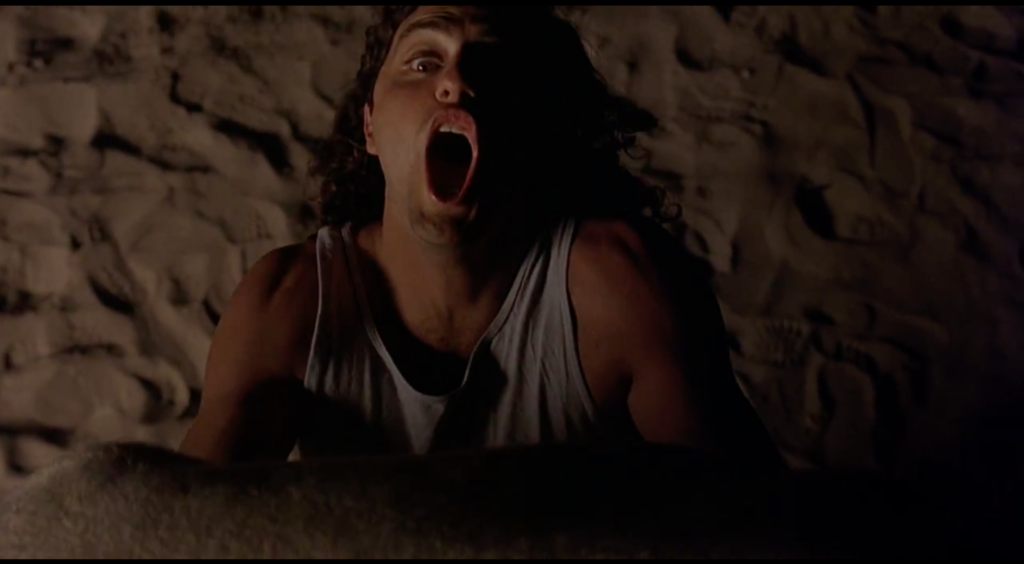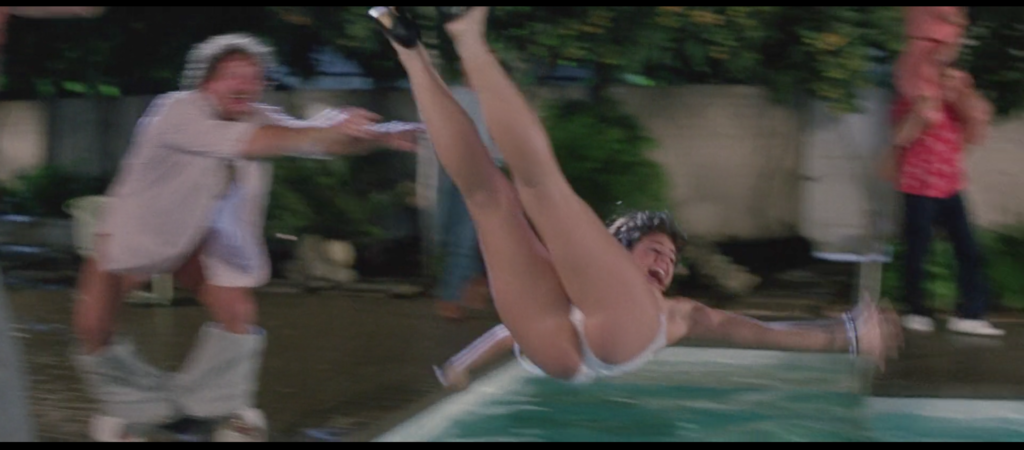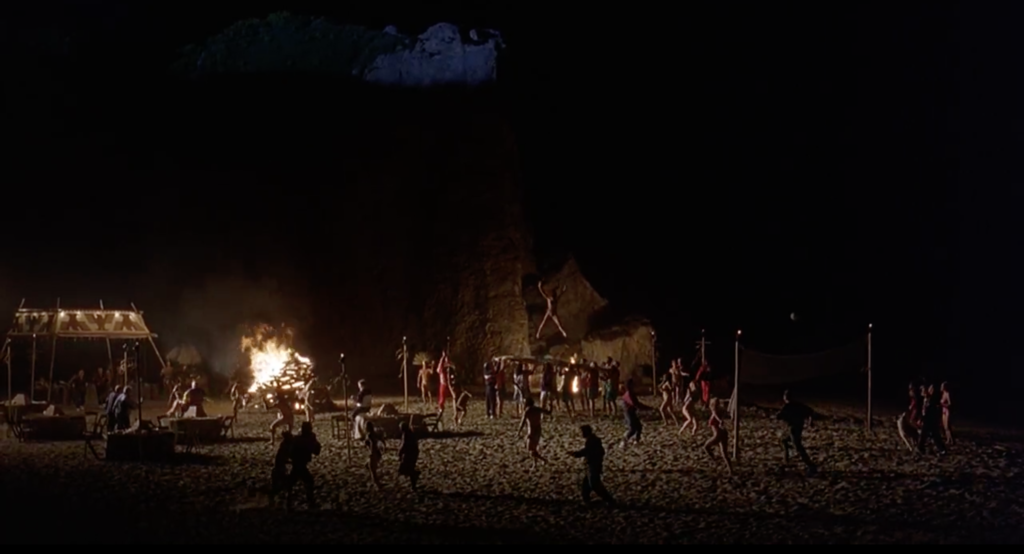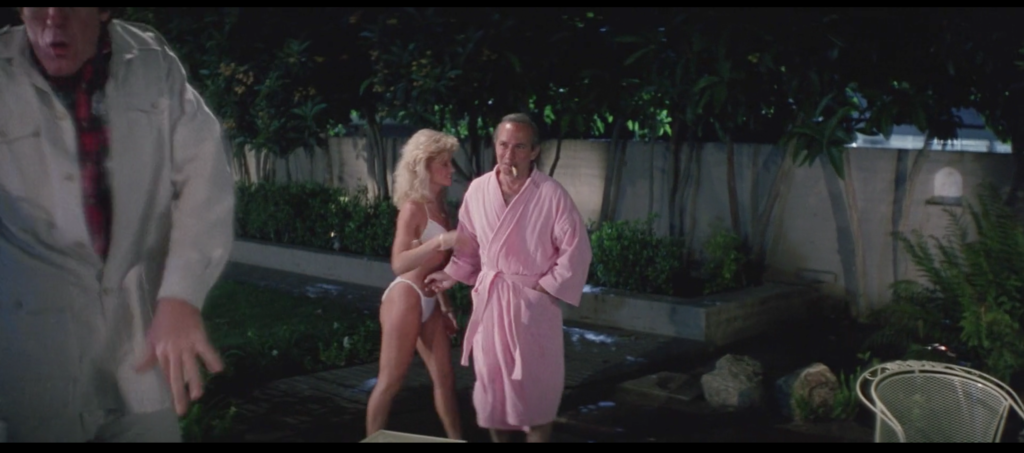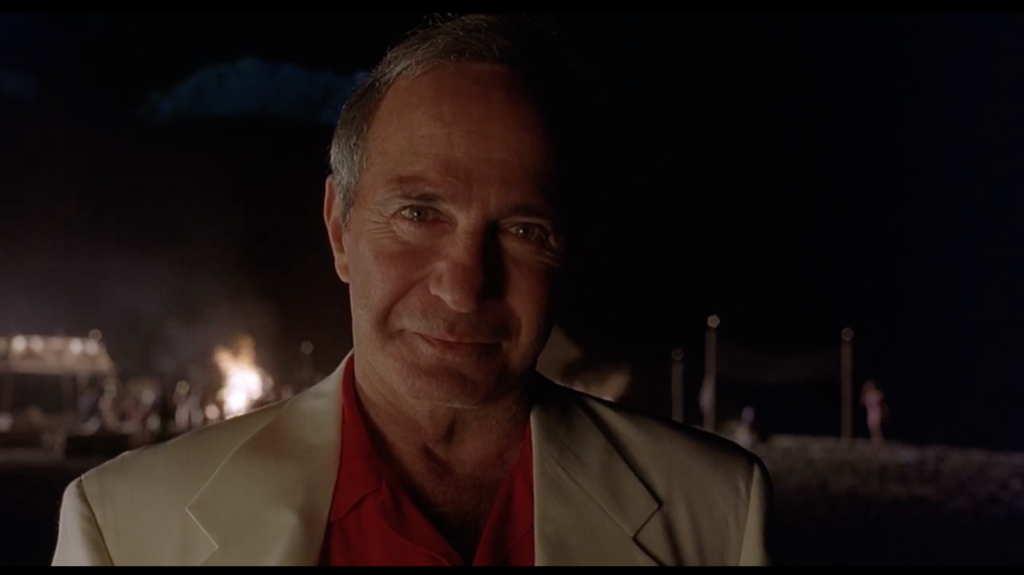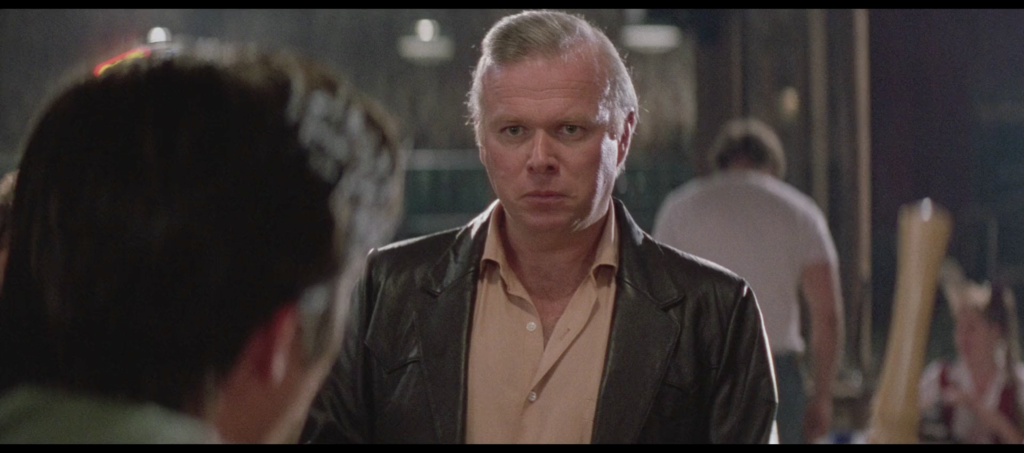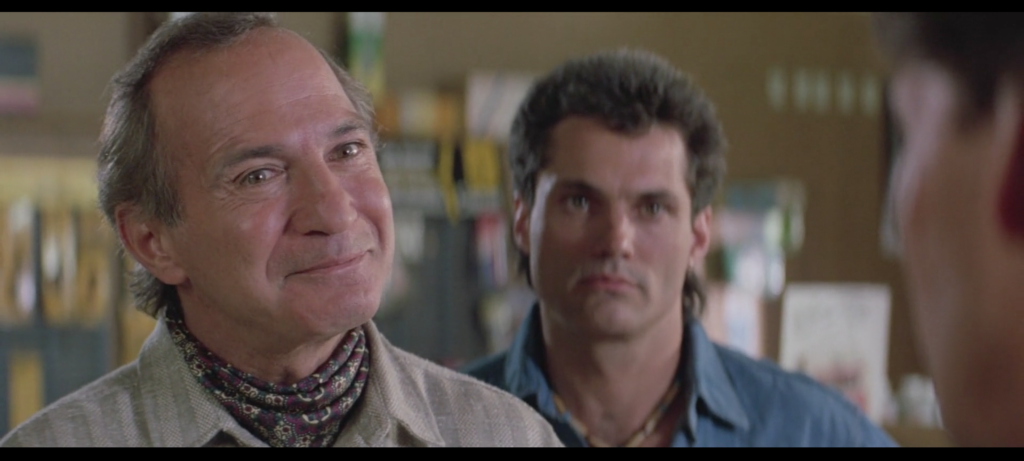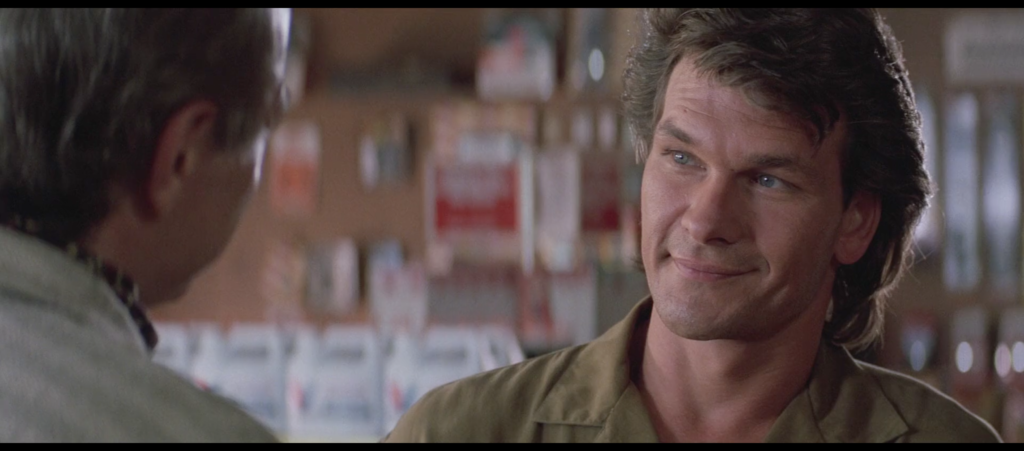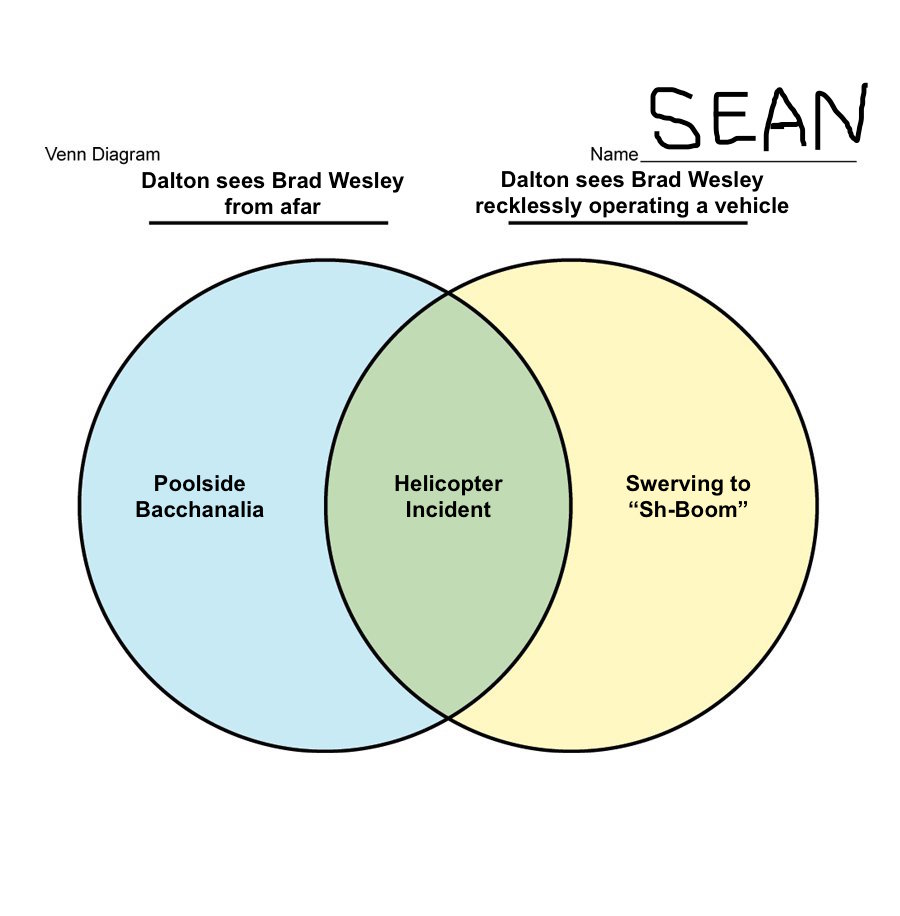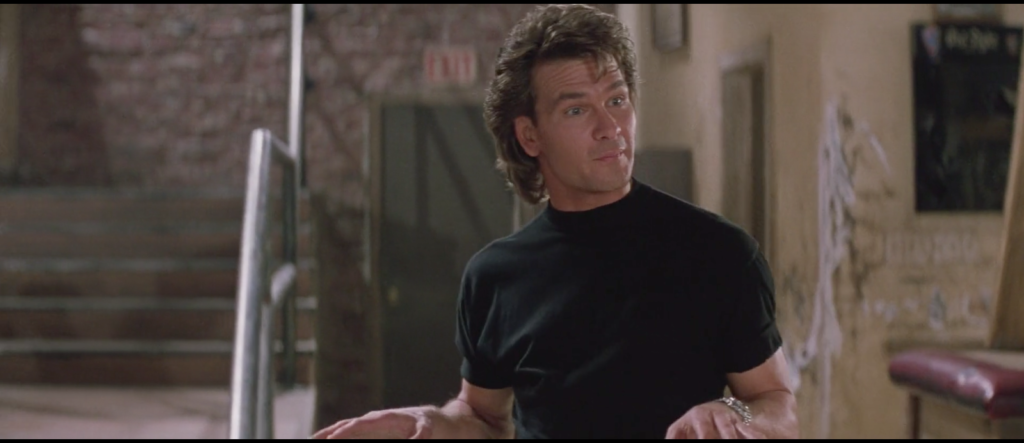Genre art uses spectacle to convey in images what words alone can’t. That’s baked into the premise of genre from the start. In real life we’re not going to be eaten by a zombie horde, burned by a swooping dragon, abducted by alien spacecraft, or caught up in a major musical number. Nevertheless, zombies and dragons and aliens and big song-and-dance routines that end with an entire street full of people doing jazz hands toward a crane-mounted camera help us articulate the big ideas and emotions we do experience in real life — terror and awe and rage and passion and joy — but lack the commensurate vocabulary to describe.
“The Act” thoughts, Season One, Episode Two: “Teeth”
“The Act” thoughts, Season One, Episode One: “La Maison du Bon Rêve”
“I like you special.” In an hour of television that includes the aftermath of a murder, the possibility of a kidnapping, and the evidence of year upon year of medical child abuse, these four innocuous words are the most frightening thing we hear. Dee Dee Blanchard isn’t lying when she says them, either. She treasures Gypsy, her frail and charming daughter. Dee Dee loves Gypsy for the things anyone would find lovable about her: her cheery disposition, her reassuring optimism, her own love of all things bright and beautiful. Dee Dee also loves Gypsy for the what others might find burdensome: a bottomless cocktail of illnesses, including epilepsy, paraplegia, a heart murmur, anemia, a lethal sugar allergy, a condition that required the surgical removal of her salivary glands, her need to be fed through a tube in her stomach. Gypsy’s suffering, and her endurance of it, are a part of what make her special, and just as she says, Dee Dee likes her for it. That Dee Dee also manufactured this suffering makes what she’s saying no less true. It just makes it horrifying. Like the little pink house after which this episode, “La Maison du Bon Rêve” (The House of Sweet Dreams), is named, “I like you special” is a prison in disguise.
078. Morning bed
When Carrie Ann shows up at Emmett’s farm to visit Dalton the night after he fires Morgan and Pat McGurn and puts a Knife Nerd’s face through a table <exhale> this is the sight that first greets her. Not Dalton nude, and not Dalton half-dressed and stretching and smoking and somehow hung over from reading too hard the night before—just a man, beautifully centered, in a bed, beautifully centered, in a room with hardwood floors and floor-to-ceiling windows, glowing with natural morning light reflected off the waterfront view outside. It’s just ridiculous, for a movie this dumb, to have a shot this pretty with light this lovely. It’s like Barry Lyndon up in here, for real.
But it’s also the one moment during which I can kind of sort of imagine being Dalton. Not fighting people for a living, no. Certainly not fighting people and winning for a living. Not parading around nude in front of my coworker. Not smoking and stretching, simultaneously, first thing after I roll out of bed. Not doing either thing separately either. Not grabbing another Jim Harrison novel while murmuring “Hair of the dog that bit me” or whatever the appropriate response is to getting a hangover from reading Legends of the Fall might be. Not pissing off foundational figures in the hardcore wrestling, Los Angeles punk, and John Cassavetes acting scenes in one fell swoop. Not giving goofy little salutes to people as we say our goodbyes. Not commanding a $350K salary. Not having sex with a doctor of nebulous speciality played by Kelly Lynch, though I suppose not not doing that either. Not accepting any offer made to me by any character played by Kevin Tighe. Not festooning the mansion of a mall developer with corpses, unless perhaps they really deserved it. None of that. But sleeping in a beautiful gray-bright wooden room on the water, naked under the covers, groaning a bit as I get up but then looking around and seeing that the place I live in feels warm and inviting and special and a place like I might be happy to live in? Yeah, I can imagine that.
077. Doorway to Doc
Slashed with a knife and socked in the face by Tinker, propelled through a broken window and onto the floor in order to shake the grasp of O’Connor, dispatching both O’Connor and Pat McGurn in short order while his coworkers take Tinker down, Dalton is done with the Double Deuce for the night. I suppose when you’re pulling down a solid six figgies to make sure a Missouri bar with an unpaved parking lot isn’t overrun by concussed hayseeds who’ll stab anyone who fails to laugh at “if I said you had a beautiful body, would you hold it against me” you can make your own hours. Love what you do and you’ll never work a day in your life, etc. So out Dalton goes, through a back door into a vaguely defined sea-green area on the other side, the bright crimson stain on his torn shirt traveling with him.
Working late in the trauma unit, Dr. Elizabeth Clay walks across the hospital hall, browsing a patient’s medical file. For a split second we catch a glimpse of a bright red wall-mounted case, for a fire extinguisher perhaps, or some kind of emergency medical device. Professional and presentable, hair in a tight French braid, face half-covered by enormous glasses that make her look as if she’s viewing the entire world on an x-ray readout, she’s a world apart from Dalton, the sweaty, bloody, disheveled man whose (latest) knife wound she’s about to staple shut.
Yet she isn’t, is she a world apart, is she? She is connected, via not-quite-but-close-enough match on action editing, directly to Dalton via his exit through the Double Deuce’s back door. Her movement picks up almost where his leaves off, with just enough of a hiccup to keep it from reading as cutesy. He walks right out of the Double Deuce and into the Doctor’s life. The Doc takes his cinematic arrival literally in stride, like she’d been walking with him all along.
“Billions” thoughts, Season Four, Episode One: “Chucky Rhoades’s Greatest Game”
“You win some, lose some, it’s all the same to me,” howls Lemmy Kilmister, the raspy singer-bassist of the heavy metal band Motörhead in their signature song, “Ace of Spades.” As he explains over warp-speed riffing, when it comes to gambling, “the pleasure is to play.”
The metal fandom of the hedge-fund billionaire Bobby Axelrod (Damian Lewis) has been a key trait of that character from the start. It is equal parts enjoyment and self-aggrandizing, bad-boy image-making. But rarely had it been deployed as astutely as when he made his first onscreen appearance this week, in the Season 4 premiere of Showtime’s ruthlessly entertaining financial thriller, “Billions.” As “Ace of Spades” powers the soundtrack, we’re reminded that no matter what game they’re playing, men like Axe aren’t happy unless they go all-in on every hand.
I reviewed the season premiere of Billions for the New York Times. Please note that I’m playing catch-up on posting links to these reviews, so my descriptions will be pretty bare-bones. I hope you enjoy the reviews!
075. Big Truck Energy
It occurs to me, sitting here as I begin to write today’s Road House essay, that one of Brad Wesley’s goons is almost certainly a serial killer.
Look at this. This is two carloads of goons pulling into Brad Wesley’s drive way so he can chew them out for their failure to reinstate his sister-son Pat McGurn to his job as bartender at the Double Deuce. In the Oldsmobile you’ll find the people responsible for the debacle: Tinker, O’Connor, and Pat himself. Jimmy is in the mansion with his father (source for this claim?). Riding shotgun in the monster truck is Karpis, the dashing thug who vanishes from the film without fanfare, and Ketchum, the anonymous thug who has a boot-mounted knife and will go on to murder a main character with a knife he keeps in a sheath on his belt.
Ketchum, you may recall, or you may not recall more to the point, is the most anonymous goon in the whole movie. Jimmy, Tinker, O’Connor, Morgan, Pat—they’re all mentioned by name, repeatedly. Karpis is not mentioned by name and is absent for the back two thirds of the film, but he looks like Karpis and thus is tough to forget. Ketchum looks like a teamster who got a speaking part when the real actor canceled due to a family emergency and they found out he had his SAG card. He looks like the guy buying a phone ahead of you at the Verizon store. He looks like your friend’s mom’s evangelical cousin on a Christmas card with a family portrait on it that they forgot to take down until you went over to your friend’s place for the Super Bowl. He looks like the guy drying his hands next to you in the rest stop men’s room on the New Jersey Turnpike. He looks like everyone and no one. He’s every white man, it’s all in him. Anything you want done, baby, he’ll do after the gym.
Yet he carries around a knife you could stop a White Walker with. He has retrofitted at least one normal item of clothing that we know into a deadly weapon. When he’s summoned to his boss’s place for a talking-to, he drives over in a monster truck the way you or I would hop in a Mitsubishi.
So he’s a white man in his 30s. He’s blandly, anonymously handsome. He has a barely concealed fixation on instruments of torture and death. He’s a knife guy, and a gun guy too most likely given later events. He’s outwardly conservative in appearance but he indulges in the occasional ostentatious “how did we miss this?” affectation: Instead of dressing up like a clown for children’s parties, or hanging out in cop bars, or keeping a human head in the closet of his boyhood home, he drives around town in a monster truck. It’s like he’s daring you to notice, knowing you won’t be able to bear looking too closely if you do.
074. “Jesus Christ!”
Jack is the voice of the people. Leave it to men like Dalton and Wade Garrett to take in the chaos of the bouncer lifestyle and reply with a wry smile and a quip, or with stoic silence. Less seasoned than his mentor and his mentor’s mentor before him, Jack has much of their inherent courage, decency, and adaptability, but lacks the sangfroid common to the cooler. When faced with, say, a bloodied Pat McGurn getting spin-kicked by Dalton through Frank Tilghman’s plate-glass office window, he’s not going to gently shake his head and chuckle to himself or something. He does what you and I might do: make a face conveying almost comical levels of disbelief and gasp “Jeeesus Chrrrist!”
It’s a not dissimilar reaction to the one he has when Horny Steve’s latest lady friends try to gain access to the Double Deuce by presenting, as ID, a Sears credit card. Sometimes we need a man like Jack to say “This is a Sears credit card” in such circumstances—not to elevate the problem to the realm of the philosophical as Dalton might, not to make light of it with a dick joke like Wade would, but just to call it like it is. Then he leaps over the bar and runs into the fray, because he’s still a character in Road House. But the point stands.
Indeed, when you see a guy get bodily launched through a window by an itinerant bar-knight, “Jesus Christ!” is not just appropriate but salutary. We in the audience are rarely afforded a reaction to the truly ridiculous violence in this film that acknowledges it as such; god knows that several times during my initial viewing, and often thereafter, I watched people get tossed into furniture or punched in the skull and thought the moral panic about violent action movies was eminently justified, even understated.
There’s a degree to which watching Road House is like getting punched in the nose and kicked into the next room. Jack gets it. He usually does. When he says “Jesus Christ!”, what he’s really saying is “I see you, Road House viewer. You are valid.”
073. Lebowski II: Garden Parties (continued)
Road House is a 1989 film in which a shady business mogul played by Ben Gazzara flouts decency standards in a waterfront community that he controls through a combination of extravagant wealth and muscular morons. The Big Lebowski is a 1998 film in which Gazzara reprises this role.
The two orgiastic parties thrown by the Gazzara characters in these movies, Malibu pornographer Jackie Treehorn in the latter and Jasper JC Penney enthusiast Brad Wesley in the latter, have so many surface-level similarities it remains difficult for me to believe that Joel and Ethan Coen were not familiar with Rowdy Herrington’s masterpiece when they made their own. Smiling men tossing topless women through the air, the bright blue of a pool juxtaposed against the dark of the night, a general “the night time is the right time” atmosphere, the dramatic entrance of the Gazzara characters themselves, goons—it’s all there.
Yet the differences reveal much, as they typically do, even as they point to how similarly the two films often function. I vividly remember going to see Lebowski at the movie theater when it debuted and finding it a sensational film, in the sense that on a scene-by-scene basis I felt buffeted by new and unprecedented forms of ridiculousness. The Treehorn beach party is way way up there on the list, beginning as it does with a topless woman plummeting through a void with the otherworldly voice of Yma Sumac blasting at full volume. This is the impression Treehorn wished to make on the Dude as well, whom he used his goons to summon to his estate, impressed with the excess and splendor of his lifestyle, lulled into a false sense of security, drugged, and dumped in the street. It was a party for himself and his, I dunno, friends I guess?, but it was also a performance for one Jeffrey Lebowski. Treehorn’s direct-address introduction of himself right into the camera speaks to that.
Brad Wesley’s idiotically raunchy shindig has no such purpose. He and his men and women have no idea Dalton is watching from across the river; indeed it’s unclear if at this point in the film Wesley has any idea where he lives at all, and furthermore Dalton makes an effort to hide his observation of the party by switching off the light by which he was reading a Jim Harrison novel when the noise of the soiree first distracted him. Additionally there is nothing particularly disorienting or otherworldly about this parade of gawping meatheads and Mötley Crüe video extras—they simply run out of Wesley’s house in a surprisingly orderly line, start stripping off their clothes (“hot babe” bikinis for the women, the usual thug-casual style for the goons), and boogie down to Bob Seger’s “Monday Morning” of all things. Wesley arrives last but he incorporates himself into the festivities rather than set himself apart, joining his girlfriend Denise and pinching the cheek of Mountain, his tallest and goofiest goon. Where the Dude is duly impressed by Treehorn’s milieu (“Completely unspoiled!”), Dalton is merely amused by Wesley’s, a fair and perhaps even generous reaction to a party at which a central component is Terry Funk with his pants around his ankles.
The point I’m trying to make is that while the Ben Gazzara party scene in The Big Lebowski serves a concrete purpose for the Ben Gazzara character, the Ben Gazzara party scene in Road House exists simply to entertain an audience the film presumes to be pretty stupid, or at least open to enjoying pretty stupid things. Dalton, a man of diverse interests, enjoys it just fine. Thus Wesley’s power to impress and intimidate Dalton with his Dionysian powers is dissipated. When he finally does attempt to bowl the cooler over with demonstrative partying and sexuality deep into the film, when he has Denise strip at the Double Deuce as a show of masculine force, Dalton is completely impervious. This party is a vaccine.
071. The face of Frank Tilghman
This is Frank Tilghman, looking at Pat McGurn just before he confirms that he’s firing him, per Dalton’s recommendation. We’ve talked about this scene before, or rather for some reason I wrote a parody of “The Ballad of John and Yoko” by the Beatles about this scene before. We’ve talked about Frank Tilghman’s fist and Frank Tilghman’s grin and Frank Tilghman’s POV and Frank Tilghman’s Buick. But I wanted to take a closer look at Frank Tilghman’s face in this moment. Actor Kevin Tighe spends the bulk of Road House playing Tilghman as though he exists in an entirely different movie; here he looks as if he has an entirely different movie within this one facial expression.
Maybe he’s just registering the gravity of the situation. Dalton has no idea who Pat McGurn is, or who is real boss is more to the point, but Tilghman knows, and Tilghman knows what firing him really means. He’s coming at the king and he’s afraid of missing. Two seconds after Pat’s departure however he’s cracking a dumb joke about how it was a good night at the bar because “nobody died,” which, talk about tempting fate. But all things considered I prefer a different explanation.
The kid had started out as a barback. By the time he applied for the big job Frank didn’t even care he was obviously lying about bartending school. Pat was a wonder to watch back there, thrumming with the energy of youth and seemingly oblivious to its sweat-stained beauty. The first time Frank made a move closing up one night he thought “Why, the kid’s trembling!” but it wasn’t the kid at all.
It was sex at first, sex and that’s all. But it blossomed into something rich and beautiful, despite the their backgrounds. Pat’s mother, Brad Wesley’s only sister, never escaped the streets of Chicago where Wesley himself came up. Tilghman never saw much of the city. State school, baseball scholarship. Bounced from job to job, mostly managerial, never embarrassing himself but never really distinguishing himself either. His folks were old when they had him and by the time they passed there wasn’t much to pass on. He stumbled bass-ackwards into the Double Deuce in the terms of his second divorce, taking it on from his ex’s family. She never really cared for it anyway, but he thought the place had charm, so why not? If nothing else the responsibility would keep him from spiraling the way he did after marriage number one went to shit. And if he could drink to keep the part of himself he could never admit even to himself at bay, well.
Funny thing happened along the way though. Frank fell in love with the place. Then he fell in love with Pat. Music at the Double Deuce, Cardinals games a few times a season. Together. Even stopped drinking, not in time to save the two marriages but maybe in time to do right by the kid and the place of business they shared.
Then things went south, and don’t they always. Frank should have known where the Double Deuce was headed the night he swept up his first eyeballs after closing. He should have known he was so besotted with Pat that he was looking the other way at the younger man’s involvement in the bad element. Money got tight. That bouncer Morgan he brought on, well, he only made things worse. Morgan got close to Pat and Frank wasn’t worried, if you knew Morgan for longer than five seconds you’d know it wasn’t that way for him, but the big man brought out the worst in the kid, and not just the mustache, though yes, the mustache. Funny how all his life Frank worried he’d get a reputation (“You will get a reputation” his mother had said when they found him with Jim Conniff that summer day long ago, and no more was said about the subject because no more needed to be said), when the reputation he should have been worrying about was the bar’s. Different bad reputations for sure, but bad either way. Worse this way, that was the bitch of it. He couldn’t help what he was and there were days, and nights, he thought what he was was beautiful. Not even he could make that mistake about the Double Deuce.
Money got tighter. Security was a joke. The budget for replacement furniture alone was skyrocketing. For a while he thought of simply asking for a cut of the coke sales in the restrooms but didn’t want to bring down the kind of heat that action tends to draw. And Pat…well, Pat was Pat. Kisses sweet with Jack and Parliaments but something he used to see behind those eyes just wasn’t there anymore, if it ever was. Now there was something cold there, something hard, something sly and shifty and shitty. Had it always been there? Had Frank always been too big a fool to see it?
Before long he was coasting on fumes. All the accounts were dry, and the taps were soon to follow. Then one night—and Morgan was standing there in the door the whole time, goddammit how could he have been so stupid—Pat approached him. Not like that, that was over, neither of them had said so because neither had needed to. (Mama would have understood that, he’d thought to himself with a chuckle that tasted like battery acid.) Maybe that would have come to a head eventually, maybe he’d have quit or Frank would have asked him to. Maybe.
But Pat, see, he had this uncle, fella name of Brad Wesley. Yes, the Fotomat. Yes, the ribbon-cutting at Pete Stroudenmire’s Wagon Days. C’mon Frank, you been in Jasper long enough to know Brad Wesley. Throws some good parties, yeah, inn’t that so Morgan? Anyways Uncle Brad, he’s a businessman, all kinds. An investor, you might say. Helping out people all over town, like that Red Webster cross the parking lot. He’s got some cash, for one thing. Liquor too, biggest distributor in the county. Three counties, that’s right Morgan, thanks man. Three counties, Frank! And he’s author-rized me to invite you to his place for breakfast Sunday. Oh you don’t need to know why yet, Frank. Let’s just say it’ll be worth hearing.
C’mon, Frank. For old time’s sake.
Then years and tears and eyeballs later, the second ex’s mother died and wouldn’t you know it, she was fonder of Frank than she’d ever let on. With that kind of money he could have just blown town, set up shop in the Keys, or hell, just retired there. But no, goddammit, no. Let Brad Wesley win? Let him finish doing to the Double Deuce what he’d done to Jasper? To Pat—this Pat-thing behind the bar, wearing Pat’s smell and laughing his laugh and as hollow as the foundation wood that time Frank’s old man showed him the termites? Seemed to Frank the termites had gotten their share, and more than. Seemed to Frank the time had come to, for once in his life, fight.
And he knew the name to help him do it. Everyone did. And was the man the named belonged to beautiful? Yes he was.
But Frank Tilghman had learned his lessons from the barback. This was not about love, or if it was it wasn’t that kind of love. This was a land-love, a legacy-love, a kind of love Frank Tilghman never felt more strongly than when he looked into the twinkling void Brad Wesley’s eyes and felt it slipping away. It was a love worth the fight.
But oh it was hard, firing Pat. Easy for the cooler maybe, but not for Frank Tilghman, no. No, it was hard and sad and a battery-acid bitch of a thing, and did he have any idea he still felt half this much, half this strong, about the man Pat used to be, the Cardinals game man, the Jack and Parliaments man, the man he’d trembled for? He did not. He felt that feeling inside of him, fighting to get out, pounding against this ears, his heart, his forehead, his hands, the back of his own eyeballs. Who’ll sweep them up, he thought, and fought back what seemed close to madness.
And the feeling caught the words in his throat and held them there. Couldn’t have seemed long to the others, maybe they didn’t even notice at all, but in that Miller Genuine Eternity of a moment Frank Tilghman did not know if they’d ever come out at all. Get out, then, Get out he heard himself say, and it was over.
Almost. He heard Pat’s laugh as he left like a distant thunder and it made him nervous. He cracked a joke, barely realizing what he was saying but realizing even as he said it that this was his last shared thing with that man, like he was giving him a reason to laugh that would travel back in time for him to hear, just to stop that laugh from being the cruel thing it was. The cooler spoke again then. It’ll get worse before it gets better, he said. In that moment Frank Tilghman thought he’d never heard a truer thing in his life.
070. Face to face
This is not the first glimpse of Brad Wesley that Dalton has gotten. Since arriving in Jasper, Dalton has seen Brad Wesley twice from afar, first when Wesley’s helicopter buzzes Emmett’s horses, later when he watches Wesley’s poolside bacchanalia from across the river. Dalton has also seen Brad Wesley twice while recklessly operating vehicles, first the helicopter incident and then when Wesley nearly runs him off the side of the road as he swerves back and forth singing “Sh-Boom.” Here’s a Venn diagram to help you keep track.
But their encounter inside Red Webster’s auto parts store the day Dalton visits to buy what he needs to repair his vandalized car is the first time Dalton and Brad Wesley meet face to face. No sparks fly. No cutting words are exchanged. They don’t even shoot each other dirty looks, though Red sure is unhappy to see Wesley and Wesley’s bastard son (source for this claim?) Jimmy stares at Dalton like he’s a starving man and Dalton is a steak he’s really mad at for some reason.
No, it’s all smiles and handshakes when these future nemeses first meet. Wesley exchanges his hand and introduces himself, Dalton takes it and returns the favor. Red even goes so far as to explain to Wesley that “He’s working at the Double Deuce,” though whether to subtly impress upon the nefarious businessman that the bar will no longer be easy pickings for him or to simply make smalltalk with a man with whom he’s forced to be cordial is anyone’s guess. “Oh, terrific, hope you’re gonna clean that place up!” Wesley enthusiastically croaks. “Bad element over there. Well, anything that I can do for you….” Later that day Wesley will send Tinker, O’Connor, and Pat McGurn to the Double Deuce, and two of those men will attempt to murder Dalton at knifepoint. For now Dalton simply returns Wesley’s friendly grin, thanks Red for the aerial, and meets Jimmy’s steely gaze as he exits the place.
If you’ve read seventy essays about Road House in seventy days you know enough about Dalton to know he hasn’t been snowed by this dude. For one thing there are his previous three first impressions of the man, none of them good. For another it’d be hard to miss the way Red tenses up when Wesley walks in, or the fact that Wesley travels to the auto parts store with a dead-eyed denim-clad psycho who looks like he came home from ‘Nam with one of them funny necklaces. Indeed it seems fair to assume that the reason Dalton performs tai chi by the riverside while glistening with sweat later that afternoon is to shake the spiritual residue left behind by Wesley (who watches him from afar this time, chuckling to himself with amusement). No, Dalton’s cooler-sense is tingling, you can bet on it.
But Red Webster’s auto supply store is a place of dreams, a nexus, if you will, of realities that are and were and yet may be. Is it so hard to imagine a world in which this handshake, these smiles, are the sum total of the interactions between these two men? A world at peace, in which the war between Dalton and Brad Wesley never takes place, where countless limbs go unbroken, where multiple homes and businesses are never destroyed by explosives or monster trucks, where no one dies so that the new Double Deuce might live?
‘True Detective’ Season 3 Is ‘Twin Peaks’’ True Heir
When that one-eyed man popped up at Amelia’s book reading in “Hunters in the Dark,” disruptive and distraught, perhaps complicit in the central crime in some tangential way but seemingly remorseful and also very obviously disturbed by his own experiences, I didn’t think of the Black Lodge or the Red Room, Norma Jennings and Dougie Jones. I thought of Russ Tamblyn’s Dr. Jacoby, the eccentric psychiatrist who had an unethical relationship with his teenage patient, snapped when she was murdered, and wound up a conspiracy crank in the woods.
There are so many people like that in Twin Peaks, people driven to the margins of the idyllic small-town society by abuse, poverty, mental illness, drugs, or their own bad actions, never to return. Harry Dean Stanton’s Carl Rodd, wise and sad in his trailer park. Alicia Witt’s Gersten Hawyard, a onetime child prodigy clinging to her suicidal and abusive junkie lover. Lenny Von Dohlen’s Harold Smith, the shut-in with the lonely soul. Catherine E. Coulson’s Log Lady, whose prophetic gifts couldn’t save her from dying of cancer like anyone else. Addicts, adulterers, crooked cops, scheming hoteliers, lonely gas station operators.
Some are closely connected, in one way or another, to murdered high-school student Laura Palmer — herself pulled in a million different soul-damaging directions long before her murder and quite apart from the demonic forces feeding off her misery. Others have no connection at all except geography. All of them float around in the dark and icy waters of the American underclass. In Twin Peaks, Laura’s tragic murder is the crack in the ice that allows us to observe the sea of suffering underneath.
That’s what I think of when I think of True Detective season three, not Matthew McConaughey’s twitchy nihilism, nor Colin Farrell’s thousand-yard, eight-beer stare. Wayne Hays, Amelia Hays, and Roland West may well be the truest detectives we’ve met yet. But from Agent Dale Cooper on down, not even the best investigators have ever truly seen an open-and-shut case, one they could comfortably solve and file away forever. The forces that made life so hard for the Purcells and the people around them, that empowered their community’s worst elements and discarded otherwise decent people like corpses at a crime scene, will be there even if Will and Julie’s attackers are taken down once and for all. Who killed Laura Palmer?was the start of a discussion about what we do in the face of endemic pain and injustice, not the end of it. If True Detective season three wraps up with the same strengths it has displayed so far, it will ask a similar question, and offer just as challenging an answer.
“True Detective” thoughts, Season Three, Episode Eight: “Now Am Found”
It wasn’t the flashiest season of True Detective, or the scariest, or the trippiest. It was the simply the best.
I reviewed the season finale of True Detective for Rolling Stone. This was a really good show.
“True Detective” thoughts, Season Three, Episode Seven: “The Final Country”
But there’s one more revelation to discuss … and it’s a doozy. Elsa Montgomery, the documentarian interviewing Wayne in 2015, directly connects his case to the one pursued by — you guessed it — Rust Cohle and Marty Hart, who we even get to see in a newspaper clipping. Isn’t it possible, she wonders, that both crimes were part of a massive conspiracy between rich and powerful child molesters? One in which key witnesses were repeatedly killed or mysteriously disappeared to keep the cops from getting to the truth?
How much hay should we make of the now 100-percent confirmed links Seasons One and Three? Not much, most likely. Note that Elsa claims the “crooked spiral” iconography associated with the Rust and Marty case served as a calling card for the elite pedophile ring. But that particular symbol was spread by Errol Childress — an impoverished, illegitimate, extremely mentally ill offspring of the powerful Tuttle family that really ran the show. Presenting the fancy true-crime director as well-intentioned but incorrect gets right down to the notion of: Can even the most educated investigators, whether they’re detectives or writers or filmmakers, ever really know what happened?
I reviewed the penultimate episode of True Detective Season Three for Rolling Stone.
“True Detective” thoughts, Season Three, Episode Six: “Hunters in the Dark”
But forget, for a second, the series’s first two divisive seasons and their maddening whodunits. True Detective Season Three has turned into a show about how a single, central crime spreads like a spiderweb into a whole host of small-town sins. Racism and sexism, poverty and class warfare, sexism and homophobia, addiction and religion: They all play a part here.
Even as old men, Wayne and Roland may eventually discover the truth beneath it all. But maybe the point is that some mysteries of the human heart are simply too big to solve.
“True Detective” thoughts, Season Three, Episode Five: “If You Have Ghosts”
What makes this not just ironic but fascinating is that Hays and West are easily the least weird, least corrupt, least abusive protagonists that showrunner Nic Pizzolatto has created yet. They like each other. They’re capable of long-term romantic relationships with intelligent women who have lives of their own (even if those relationships eventually end). They’re dedicated to solving the case, even if it means defying the higher-ups. Sure, they’re gruff and have a tendency to play bad cop/bad cop when interrogating suspects, but it’s nothing you haven’t seen in like two dozen Law & Order characters. You could even say that they are [drumroll] … true detectives!
And yet the case is as much of a mess as the hunt for the Yellow King. Why?
The answer is rooted in the previous seasons, and not because of various subreddit-worthy clues indicating they occur in a shared universe. Whether Matthew McConaughey or Rachel McAdams were in the lead, those stories left the power players behind their central crimes untouched, even if individual mysteries got solved.
You don’t need to believe in Carcosa to understand that there are evil forces at work in the world that no murder investigation can eradicate. Poverty, race, class, alcoholism, political corruption, misogyny, people just plain being shitty — they all conspired to commit this crime. Catching the killer won’t stop any of those factors from destroying more lives. Not even a keen-eyed Vietnam War tracker and his trusty by-the-book companion can stop that destruction. The best they can hope for is to preserve the peace, along with some of the pieces.
I reviewed episode five of True D S3 for Rolling Stone. By now it’s become clear that Nic Pizzolatto has a very firm grasp on this material.
“True Detective” thoughts, Season Three, Episode Four: “The Hour and the Day”
The thornier material here centers on Tom and Lucy Purcell, the estranged alcoholic parents of the murdered boy and missing girl. When Roland picks up the former from a bar where he picked a fight with a man that his wife slept with, he spits out the n-word to describe Hays; the black cop’s assignment to the case, he claims, proves that no one’s taking it seriously. But when West sticks up for his partner, saying he’s the best detective on the job, Tom apologizes, immediately and repeatedly — and digs deep into his own despair.
“I can’t be in that house, man,” he says, sounding like a broken man even before he adds, “I just wanna die all the time.” It’s an absolutely heartbreaking performance from Scoot McNairy — the fact that it begins with a racial slur and ends with him begging the cop not to reveal his shameful bigotry only makes it more so.
This is doubly true of Lucy, whom Amelia visits. The moment the teacher offers a shoulder to cry on, the grieving mom unleashes a torrent of self-loathing. “I’ve got the soul of a whore,” she says, lamenting her neglect of her kids. Her pain takes the form of rhetorical questions: “Children should laugh, right?” And: “What kind of woman hates the only things that ever showed her love?” Wishing she had the courage to use her gun on herself, she begins just straight-up bawling and howling “God forgive me.” Actor Mamie Gummer is so convincing here you want to cover your ears.
But when she takes poorly to her visitor’s suggestion that she reach out to Wayne with any information she might not have previously revealed, an entirely different sort of pain starts pouring forth. She immediately turns on the teacher, exploding in a sudden fireball of racist invective so intense that her visitor almost runs from the house. Anyone who says suffering is somehow ennobling is clearly fooling themselves.
“True Detective” thoughts, Season Three, Episode Three: “The Big Never”
The real difference now is that the dialogue and performances line up with the relatively linear plot. Mahershala Ali, Carmen Ejogo and Stephen Dorff may play characters tied to a major crime investigation, but other than that they act like normal people. They drink a bit too much when they want to have a good time, or when they want to forget bad ones. They fall out of touch when they take different jobs (“Once we stopped working together, we just … stopped,” as Roland puts it) but are happy to reunite. They complain about the size of big-box stores, racial disparities in the state police, whether or not they spend enough time with their kids. West even holds Tom Purcell’s hand to pray as part of the recovering alcoholic’s surrender to his Higher Power. It’s hard to imagine Marty Hart or Ray Velcoro doing anything of the sort. Never mind the flat circles of time; what you’ve got now is a True Detective that’s shooting straight instead of weaving spirals.
I reviewed episode three of this straightforward season of True Detective for Rolling Stone.
069. The Third Rule, Verse 3
“This is the new Double Deuce,” says Frank Tilghman. We are at the start of an all-hands staff meeting, and Tilghman is pointing to the concept art for the bar’s redesign. But standing nearby is his latest hire, Dalton. It is through Dalton, with Dalton, in Dalton that the new Double Deuce will be achieved. Dalton embodies the new Double Deuce. He is its future.
When Dalton takes over as cooler he becomes more than just the chief bouncer. His role is not to handle a series of discrete incidents, but to institute sweeping reforms that will eliminate such incidents forever. “It’s going to change,” he states—not a threat, not a promise, a fact. His bouncers, too, must change for this to take place. As below, so above.
Bouncing on the Dalton Path is a matter of following “three simple rules.”
This, once more, is the third.
3. Be nice. (continued)
We’ve established the Third Rule’s Great Commandment, and we’ve examined its combination of theory and praxis. Today’s lesson follows closely in the latter’s footsteps. Almost literally, insofar as it’s about walking.
You’ll recall that the previous lesson introduced the parable of the man who gets in your face and calls you a cocksucker. In the lines that follow, Dalton continues the story. “Ask him to walk,” he advises his bouncers regarding such a person, “but be nice. If he won’t walk, walk him, but be nice. If you can’t walk him, one of the others will help you, and you’ll both be nice.”
By now his voice is pleasant, almost cheerful, the “it’s my way or the highway” edge to it long gone. It stands to reason, since the whole point of this passage is that neither he nor anyone else need walk his way alone. You can do so side by side, arm in arm, perhaps even hand in hand. Indeed his delicate double-handed gesture when he says “and you’ll both be nice” suggests nothing so much as a pair of children playing “Heart and Soul” together on the piano in the school music room.
This is the least difficult portion of the rules so far from which to glean the hidden moral instruction beneath the practical element. By way of comparison, eep in mind that “turn the other cheek” was as literal as it gets, at least within the context of the sentence in which Jesus introduced the concept: You get socked in the side of the face, you offer up the other side too. Yet hundreds of millions of people over thousands of years had no trouble figuring out what he was getting at.
I’d like to think that Jack, Hank, and Younger understand that Dalton is talking about more than just the problem introduced by Hank at the start of the Giving of the Rules: “A lot of the guys who come in here, we can’t handle one-on-one, even two-on-one.” Aiding a fellow bouncer in the ejection of a particularly recalcitrant or powerful patron is important. Even reiterating that the purpose of bouncing is to bounce the patron out of the bar, not bounce his head off of it, is important. But is “If he won’t walk, walk him,” so far removed from “it was then that I carried you”? Is “one of the others will help you” so different from “For where two or three are gathered together in my name, there am I in the midst of them”? Seeing yourself as part of a whole that includes the patrons, the bouncers, and the bar—that is the key that unlocks the new Double Deuce, the nice Double Deuce, a house with many mansions. When you walk through the storm, hold your head up high, and don’t be afraid of the dark.


